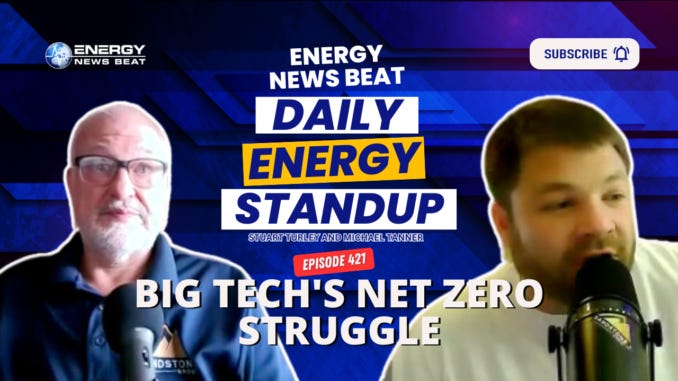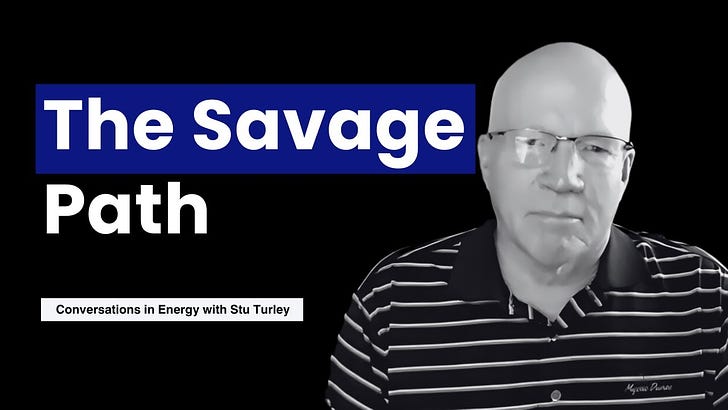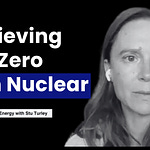Daily Standup Top Stories
China’s banking turmoil: 40 banks vanish as crisis deepens
The Chinese banking sector is facing a severe crisis. In just one week, 40 banks disappeared, and the collapse of Jiangxi Bank has further deepened the sector’s problems. Experts warn that the situation could have […]
Bad News From China Could Be The Harbinger For Lower Oil Prices
From the mid-1990s to onset of Covid at the end of 2019, China almost singlehandedly drove the commodities supercycle, consisting of ever-increasing prices for the key materials it required to drive its extraordinary economic growth. […]
UK Likely to Miss Its 2030 Clean Power Goals
The UK is poised to miss its ambitious target to decarbonize its power sector by 2030 even as it is boosting solar and wind developments, analysts say. The new UK government of the Labour Party, […]
Russia Considers Building Oil Refinery in Cuba
Russia and Cuba have discussed the idea of building an oil refinery in Cuba with the help of Russian companies, the deputy speaker of the Russian parliament was quoted as saying. During a visit of […]
Big Tech Struggles on the Path to Net Zero
Before everything got disrupted by the attempt on President Trump’s life, I had written a post last week titled “Big Tech On The Path To Net Zero.” That post looked at the most recently issued […]
Australia’s Woodside to buy Tellurian
Australian LNG player Woodside has entered into a definitive deal to buy Tellurian, the developer of the Driftwood LNG export project in Louisiana. Woodisde said in a statement the consideration for the transaction is an […]
Highlights of the Podcast
01:43 – China’s banking turmoil: 40 banks vanish as crisis deepens
03:15 – Bad News From China Could Be The Harbinger For Lower Oil Prices
05:15 – UK Likely to Miss Its 2030 Clean Power Goals
07:40 – Russia Considers Building Oil Refinery in Cuba
09:47 – Big Tech Struggles on the Path to Net Zero
13:25 – Markets Update
16:21 – Australia’s Woodside to buy Tellurian
19:09 – $SM Debt Offering: $1.5B
Follow Stuart On LinkedIn and Twitter
Follow Michael On LinkedIn and Twitter
– Get in Contact With The Show –
Video Transcription edited for grammar. We disavow any errors unless they make us look better or smarter.
Michael Tanner: [00:00:14] What’s going on, everybody? Welcome into the Tuesday, July 23rd, 2023 edition of the Daily Energy News Beat stand up. Here are today’s top headlines. First up, China’s banking turmoil 40 banks vanish as crisis deepens. My oh my. Not great news out of China staying there. Bad news from China could be a harbinger for lower oil prices. We’ll fly over to the UK. UK likely to miss its 2030 clean power goal. I’m shocked to hear that will bounce over to Russia. They consider building an oil refinery in Cuba. Super interesting. And finally at home. Big tech struggles on path to net zero Stu,. Then toss it to me. I will quickly cover what’s going on in the oil and gas markets. Mainly we we saw a decent drop in oil prices today, mainly off the back of some of the political craziness that’s happened over here. We do have an M&A deal. Australia’s Woodside to buy Tellurian and specifically that driftwood LNG project they have sitting out there. So we will cover that. And then finally we’ll quickly cover on Eskom officially announcing an upsized private offering of about 1.5 billion of senior notes, half of them due in 2029. Half of them do in 2032 to cover the Excl acquisition. We will cover all that and a bag of chips. Guys, as always, I am Michael Tanner, joined by Stuart Turley. Where do you want to begin? [00:01:43][88.1]
Stuart Turley: [00:01:43] Let’s start with our buddies over there in China. China banking turmoil 40 banks vanishes. Crisis deepens. Michael, a financial crisis is never good. Reports from China indicate the collapse of one of the banks. The prime portal. Raimondo R-n, m I and Broadcom published a report from outside its headquarters in zinc Bank, which concerned climate Lions stormed over bankruptcy rumors. There are 40 banks, ¥55 trillion, $7.5 trillion, representing 13% of the country’s banking system. Wow. [00:02:23][40.1]
Michael Tanner: [00:02:24] That’s truly unbelievable. It’s I mean, and the difference is they’re so integrated with the government. You know, there’s there’s something going on from the top down. [00:02:34][9.2]
Stuart Turley: [00:02:34] And this is why it is incredibly frightening. Whenever you see countries like this in the past where they have banking problems, they go to war. This is frightening. I’m saying. [00:02:48][13.7]
Michael Tanner: [00:02:48] Is it really? No, it really is frightening. And from the standpoint of, you know what this means for energy, I mean, they’re a huge you know, we talk about this every day in the finance section. They’re a huge. [00:02:59][11.0]
Stuart Turley: [00:03:00] Buyer. [00:03:00][0.0]
Michael Tanner: [00:03:01] Buyer and sentiment driver of where prices are going to go. If the Chinese economy doing well, so will oil prices go because they’re going to buy more oil. So it’s going to be super interesting. You’ve got another one here. You know specifically I think we move into that next that yeah. [00:03:15][14.3]
Stuart Turley: [00:03:15] Bad news from China could be the harbinger of lower oil prices. This one was pretty interesting from the mid 1990s to the onset of Covid in 2019, China almost single handedly drove the commodity supercycle. And this is really important. It looks like May’s 5% growth and it’s the second straight month showing a decline. Q2 figures highlight the divergence of growth. Drivers persist. It’s bad dude. The Q2 numbers confirm the momentum of monthly data. Perm, France on industrial production on Non-manufacturing PMI. [00:03:52][36.9]
Michael Tanner: [00:03:53] Yeah, it’s it’s not good I mean to you layer in some of the stuff that’s happening politically here. The markets today have sort of reacted to what’s going on with President Biden deciding not to run again. The apparent Trump’s going to win in 2024 or, you know, here, here in November. What does that mean for for oil production? We love oil production. That could necessarily mean lower prices. So it’s as China goes, so will oil prices in the terms of if we’re going to see rising production here, the only way that, you know, the only positive indicator on the sentiment side for oil prices is going to be where in the international markets are things going. China may be the only place it’s going if we’re seeing bank collapse and a contraction of their economy. Oh, hold on to your pants, folks. [00:04:41][47.8]
Stuart Turley: [00:04:42] Yeah. In the last article, in the last paragraph here, they say they’re still buying everything they can from Russia and Iran because they’re not buying them in Petro dollars. So and they’re buying it at a reduced rate. Yep. And both of those are outside of OPEC not OPEC plus. So I mean it’s it’s really I got a podcast with David Blackman and Josh young. Thank you Josh Young on Wednesday to talk about pricing on this. [00:05:10][28.0]
Michael Tanner: [00:05:10] Yeah though super interesting. We’ll we’ll we’ll look forward to seeing that. All right. What’s next? [00:05:14][4.1]
Stuart Turley: [00:05:15] Let’s go to UK. I’ll tell you what. UK likely to miss its 2030 Clean Power goals. Really? I can’t believe this. I am so I’m so shocked. As part of its ever efforts to boost clean energy, the UK government lifted the defacto ban on onshore wind, which has been in place in England since 2015. The government has committed to doubling its onshore wind energy by 2030, quadrupling offshore wind and tripling solar power by the end of the decade. Michael, they’re going to go broke. They are. Their whole new government is is brand new. And they are absolutely just going to break the UK. [00:06:00][45.1]
Michael Tanner: [00:06:01] Yeah I mean it’s it’s it’s pretty you got the Financial Times analysis. This just cracked me up. Well it’s you got this. This is the most English company you’ll ever heard of who did this analysis? Cornwall Insight. It’s about as English as it gets. [00:06:15][14.1]
Stuart Turley: [00:06:15] It’s sort of like a really horrible meal. I mean, it’s really the bland. [00:06:20][4.2]
Michael Tanner: [00:06:20] Here’s the here’s the quote from Kate Mulvaney. She’s a principal consulted over there at Cornwall Insight Cheeses. That labor quote faces significant challenges in reaching their 2030 power decarbonization targets as financial constraints, supply chain challenges and intense global competition for limited resources power pose hurdles. I mean, there’s a three pronged approach there. You you you’ve got to have the money to be able to do this. It’s huge investment. You’ve got to be able to get these these raw materials. A lot of them are coming from Africa. We know what’s going on over there in terms of child labor, in terms of unsafe working environments. And, you know, with the amount of subsidies which have gone into this over the years, the massive entrants have flooded the market and it’s almost become a dime a dozen to have your own renewables company, because why not? You’re going to get a nice big government check for that. You know, the UK Climate Change Committee said did say last week that its latest assessment show that the you or did say that the US, the latest assessment showed that the UK is off track for net zero only as a third, as only a third of the emissions reductions required to achieve the country’s 2030 target are currently covered by credible plan. So even the climate change committee over there says they’re not going to work. [00:07:29][68.8]
Stuart Turley: [00:07:30] That’s bad when the climate change police are, you know, confronting the mattress police mattress tag police, right. [00:07:37][7.6]
Michael Tanner: [00:07:38] Yeah, absolutely. All right, let’s go to Russia. [00:07:39][1.9]
Stuart Turley: [00:07:40] Oh, this one frightens me, dude. Russia considering building an oil refinery finally in Cuba. Where would they get their crude from? Venezuela. Or think about it, Russian tankers rolling right on into the off right off the coast of the US on really horrible old sanctioned tankers, meaning, waiting for an ecological disaster to happen off the offshore right off the U.S, Russia and Cuba have discussed the idea of building an oil refinery in Cuba with the help of Russian companies. Cuba has a crude oil right. It’s logical not to import products, but to produce. Some here disagree, but they’re putting in a Russian crude refinery in Cuba is a bad thing for the US. [00:08:33][52.8]
Michael Tanner: [00:08:34] Well, for for security purposes, it absolutely is. I think, you know, from Cuba’s standpoint, I actually agree with the sentiment that if we’re not going to be able to get our crude oil from Venezuela, we got to get it from somewhere. I mean, what’s going on right now is that they’re they’re having massive fuel shortages. You’ve seen what’s the quote in here? Earlier this year, Cuba, which has seen chronic shortages of gasoline and other fuels, said fuel prices would jump by nearly 500% on February 1st, 2024. Obviously, a lot of that is being subsidized by the government when you can’t subsidize, because you can’t infinitely subsidize things that aren’t necessarily making money, when you can’t, when you when you don’t have other places to bring in those subsidies from that are quote unquote, making money. So, you know, this is the only logical conclusion. I do think it’s a huge security, not failure, but a huge security risk for the United States. Now that you’re like you said, you’re going to have Russian ships being able, you know, coming in and out on a, on a, on a regular basis. I mean, it’s all around from the United States perspective. Not good. But if you’re Cuba, what else can you do? You got to get your oil from somewhere. [00:09:36][62.4]
Stuart Turley: [00:09:37] I’ve said this before, I wouldn’t want to do business with the United States right now. So you got to do what you got to do to survive. But for the United States, it’s not good. No, it’s not good. Let’s go to the next one here. Big tech struggles on the path to net zero. Net zero is a really a misnomer and a missed target before everything got disrupted by the attempt. This is the first paragraph out of the article. Before the everything got disrupted by the attempt on President Trump’s life. I had written a post last week at Big titled Big Tech on the Path to Net Zero. It really looked substantially at the sustainability. Reports from Google, Microsoft, and meta, and all three admit to going rapidly in the opposite direction from net zero as their business models grow into power data. At least, they admitted quietly, it writes. [00:10:29][52.0]
Michael Tanner: [00:10:30] At least they do. What’s funny is I love how they put this out. You know, it’s middle of 2024 and Amazon finally just released its 2023 Sustainability report. So I I’d love to be on that team which could work which could work that slowly. [00:10:45][15.5]
Stuart Turley: [00:10:46] Yeah. We don’t work that way around here. Apple 2030 is our commitment to be carbon neutral for our entire footprint. By the end of the decade. We will get there by innovating at every stage of product lifecycle, from how they’re made to what they’re made from. That starts with beginning new clean energy online across our supply chain. Today, with more than 320 suppliers, we have committed to using renewable electricity for Apple production. With over 16GW already online, they’re avoiding more than 18 million metric tons of greenhouse gas emissions. [00:11:21][35.6]
Michael Tanner: [00:11:22] I love this Apple’s introductory level, Apple 2030 is our commitment to be carbon neutral for our entire footprint. Notice it’s not carbon net zero anymore. It’s carbon neutral neutral rolled out net zero. That’s sleight of hand. Remember that for their entire footprint by the end of the decade, we’ll get there by innovating every stage of the product lifecycle, blah blah blah blah blah. This is what I find super interesting today. More than 220 suppliers committed to using renewable energy for electric Apple production, which over 16GW already on line. They’re avoiding more than 18 million metric tons. Okay, get this to 320 suppliers. You’ve committed to using renewable energy for Apple production. So what does that mean? They flip on the wind farm when they’re working on Apple stuff, and when they go to produce other stuff, they flip on natural gas? No, the answer is nobody knows what they’re using. It’s just they’ve communicated to that. And they sent them a memo and they say, oh yeah, sure, we’ll do that. Yeah, we’ll make sure it’s coming from wind. [00:12:18][56.0]
Stuart Turley: [00:12:19] Oh yeah. It’s there’s no clue as to the methodology of how they came up with that line of emissions decreased by more than 55%. There’s no way that’s a rabbit pulled out of somebodies hat. [00:12:30][10.8]
Michael Tanner: [00:12:30] Hey, it’s it’s a good one. [00:12:32][1.7]
Stuart Turley: [00:12:32] It’s just. So anyway. Well, that’s it for me. Off to you. [00:12:35][2.9]
Michael Tanner: [00:12:36] Yeah. All right, well, we’ll go ahead and pop over and cover what’s, what’s going on in oil and gas finance guys, before we do that, we got to pay the bills. As always, the news and analysis that you just heard is brought to you by world’s greatest website, Energy News beat.com The best place for all your energy and oil and gas news. Doing the team do a tremendous job making sure that website stays up to speed. Everything you need to know to be the tip of the spear when it comes to the energy and the oil and gas business. Hit the description below for all of the links to the timestamps links to the article so you can check us out. And you can also hit us up on Substack, where you can get all the articles that we are going to cover in this in the show as soon as we report it, aka the afternoon prior. So go ahead and check that out. The energy news beat.substack.com as always again www.energynewsbeat.com. [00:13:23][47.2]
Michael Tanner: [00:13:25] You know oil prices continue. Well they will start with the overall markets though S&P 500 rebounded a little bit after seeing three three days of absolute not carnage but but but but dropping relative to what we would have what what’s been going on right now I mean markets today up one point basically one percentage points for the S&P 500. Nasdaq was actually up 1.5 percentage points. Two year yields ten year yields fairly flat with ten year yields outperforming two year yields by three quarters of a percentage point. High dollar index basically flat. We saw Bitcoin basically flat again $68,000. After rising a little bit overnight. Crude oil shaves off about 3/10 of a percentage point but was down below $78 until rebounding recently. Here in the afternoon, Brant Oil actually saw about a one tenth of a percentage point rise 8262 natural gas actually was up five percentage points, $2.24. So still still low. But for a variety of reasons on the oil side, mainly what’s happening is the fact that, you know, as, as as markets have fully open now, it’s the sentiment mainly around one what’s going on in China, as we mentioned early on in the show, with these banks disappearing, with all the turmoil that’s going on, a big buyer of international crude, we know they’re still buying crude, but the fact that they’re not going to be buying either buying outside OPEC and outside the Petro dollar doesn’t bode well for, you know, forward looking oil, you know, oil demand sentiment, which is where a lot of this stuff is baked in. And the fact now that we’ve officially seen President Joe Biden, as we talked about the show yesterday, dropping, pulling his hat out of the race, you know, still a little unclear who’s going to be that Democratic nominee. Looks like most people are circling the wagons around the a Kamala Harris. Good point is, though, the market still thinks if you look at the betting markets, they still believe. And I think most people. Would tell you, you know Trump’s going to win in November and that mix with China. You’re going to see an increase in you see an increase in supply, a decrease in international demand. But what does that do for prices. Well, it’s going to drop them. So you know that I think this week or at least today the sentiment is leaning towards supply up, demand down. That’s going to lead to a price fall on the natural gas side, though, mainly what we’re seeing today is a rebound from refineries and export facilities opening up. Since Hurricane Bevel Freeport LNG saw an increase of about. Hi I was I saw it here earlier. Feed gas was up about 25 percentage points into Freeport down there in Texas, which is basically saying hey, we’re we’re we’re mopping up and getting up back off of kind of what what happened in Hurricane Basil. So mixed with the fact that, you know, we’ve got a little bit of a heating dip this week, especially in Texas, but the South is about to see throughout August, a huge, huge heat wave which will most likely drive, you know, drive power consumption, which should bode well for natural gas prices. So markets rewarding natural gas prices in that point. [00:16:21][176.5]
Michael Tanner: [00:16:21] The other thing we saw, as do Australia’s Woodside to buy tell Renee and this is you know Woodside’s an Australian LNG player. They go ahead and enter this deal to buy Iranian and specifically their driftwood LNG export project, which is going on in Louisiana. This is an all cash payment of $900 million. And when you include that, the thing values it about $1.2 billion. Mainly what they’re obviously doing and for this is getting out in front and trying to buy in to this driftwood LNG project. Now that this Ellen, what’s interesting is this deal was obviously being negotiated, probably prior to the lifting of the export LNG ban. Now that that ban is lifted, who knows whether or not this that played a role in this. What what they are saying though, is that this was you know, this. According to a Woodside note, this presents a, quote, attractive entry into an opportunity with more than 1 billion of capital expenditures incurred to date. So what they’re saying, hey, you’ve already spent all this money, so it’s great we can buy in right at the low totem or right before this thing begins to, you know, finish its, you know, final investment decision. What’s interesting is that this actually acquisition represents a 75% premium relative to their closing price on July 19th, 2024, and a 48% premium relative to their 30 day volume weighted price average, which is absolutely interesting. You know, this, you know, they’re quoted as saying it’s a premier site, fully permitted in the advanced stage of its pre FID development with multiple strong relationships. As you guys know, earlier this year, they tell Raytheon went ahead and actually dumped the rest of their upstream assets due on energy management. They’re up here in Dallas that consist of of most of their or most all of their upstream development stuff, which was sitting down there in Louisiana, some of that Haynesville and Bossier Shale stuff down there. It’s about 31,000 acres. So that was for about $260 million. I mean, here, I think it’s a great deal, I think is also to to point out as part of this deal or Woodside is going to provide a loan to tell Renee, you know, basically a loan to themselves from about $230 million to ensure that the driftwood LNG site activity and de-risking activities. I wonder what that means. De-risking activities but maintain momentum prior to the completion of the transaction. So what this probably means is that Renee needed some cash and they needed to. Right. You know, now, yeah, I think this is a good deal all around. I’ve said this before, getting in on LNG facilities at this stage is great because it represents a way to view your company. Your purchasing has already spent a lot of money. You could have come in at the last minute, provide that kind of last little push. I don’t know how necessary it is with this. The LNG export ban being lifted, probably not going to come back, but you never know. So super interesting. [00:19:08][166.7]
Michael Tanner: [00:19:09] They’re the only thing I saw as we officially got some notes out from SM energy, they announced a private upsized debt offering of about 1.5 billion, half of that due in 2029, the other half due in 2032. And this was to fund the HCL resources acquisition, which is a joint venture there from and Cap and Rice Energy Partners. You went to basin which is actually really interesting. There’s there’s two notes here. You know, you got 6.7% senior notes, half of that due in 2029. The other half in 2032 is at 7%. So, you know, I mean that gives you an idea on how much debt that’s costing nowadays. And there’s definitely a little bit of a. [00:19:50][41.3]
Stuart Turley: [00:19:50] 7 trillion a year or something like that. [00:19:52][2.1]
Michael Tanner: [00:19:53] 7 trillion a year. It’s not that expensive. But you’re definitely you read it. Yeah. Yeah. It’s in Stanley Nickels. That’s what that’s what it is in Stanley Nickels. But this is again, assuming the XL resources closed. This has what they call a special mandatory redemption, which means that they don’t actually close this acquisition. The. Bank can go ahead and redeem all this back. You know, I’m generally not a big fan of using debt to go out and make acquisitions, especially when those acquisitions, especially when you got to go spend a lot of capital to actually develop these assets. But I want to throw up this chart here. This is from Ted Cross. He’s over there at Novi Labs. We love them over there. Basically what this chart is showing Xcel Energy. This is back when they bought their you went to those Xlf went to assets. What this showing is that the you went to Wells. The average you went to well is outperforming both the Delaware, the Williston and Midland Basin. The basically the do you it is slowly becoming and sneakily becoming one of the top plays in the United States. And that’s crazy to think about, especially because there’s only 283 wells drilled there. So the downside is the sample size is probably maybe smaller than you want. You know Delaware as you see down there’s got 11,000 wells drilled. Midland basins got 10,000 wells. You got kings only add you know, 3600 wells. But you see the average E r is substantially higher than the Midland basin, a lot better than the Wells state and slightly better than the Delaware. And right now all the rage is focused on the Delaware Basin. Big wells are being drilled down there. Right. Pretty interesting. So, you know, knowing this, I don’t feel as bad taking debt out to go acquire a company. Obviously, as SMBs going to, you know, you got to fund your acquisition some way. We don’t have cash on hand. But, you know, as as I’m not as worried per se about SME energy doing this because I think they’re actually going to see the returns relative to, you know, this acreage. The key. The good thing about XL is they have some of the best acreage out there and you to. So there is a lot of running room in this deal I am it’s pretty fascinating. Stu I again I you know, call me crazy. I don’t actually mind taking out all this debt to fund this, because I do think you’ll be able to make the money back. [00:22:10][137.5]
Stuart Turley: [00:22:11] Oh, yeah, from way you described it. [00:22:13][1.9]
Michael Tanner: [00:22:13] But again, the only way to know is drill wells. And we love that. So we’ll we’ll definitely be seeing some development there. That’s all I’ve got Stu. You got anything else for the day? [00:22:21][7.7]
Stuart Turley: [00:22:21] Oh, no. Just buckle up. We’re in for a very rough ride. [00:22:24][3.3]
Michael Tanner: [00:22:25] Yes, we are guys and we appreciate everybody sticking with us here. But with that, we’re going to go ahead and let you get out of here. Start your day. Thanks for checking us out here on this gorgeous Tuesday for Stuart Turley I’m Michael Tanner. We’ll see you tomorrow folks. [00:22:25][0.0][1308.6]
















Big Tech’s Net Zero Struggle